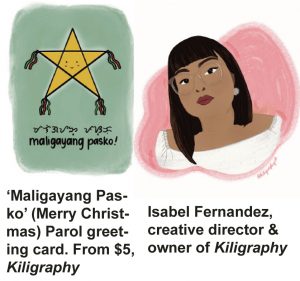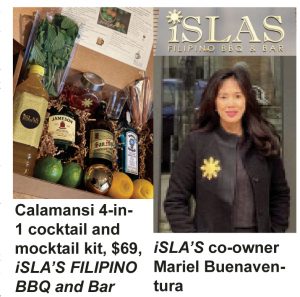A Very Pinoy Gift Guide
A Very Pinoy Gift Guide
By Irish Mae Silvestre
The Philippine Reporter
Holiday shopping might look significantly different during a pandemic. For many of us, popping into our favourite local boutiques may not be an option. However, small businesses are finding ways to adapt.
From embracing ecommerce and social media to refocusing their operations, Filipino-Canadian businesses are finding ways to reach out to customers while socially distancing.
 “Initially, we took a hit with many events being cancelled and postponed for the year,” said Isabel Fernandez, creative director and owner of Kiligraphy Co.
“Initially, we took a hit with many events being cancelled and postponed for the year,” said Isabel Fernandez, creative director and owner of Kiligraphy Co.
“But utilizing social media and virtual networking has helped us to continue what we do even through the pandemic. We were able to launch our website during the pandemic and participated in two Magkasama Virtual Markets which helped us gain a solid following.”
According to a 2018 government report, 97.9 percent of the economy is made up of small businesses – businesses that have borne most of the brunt of the pandemic’s financial impact.
 “Our sales dropped more than 50 percent,” recalled Mariel Buenaventura, who manages and co-owns Toronto-based iSLA’s Filipino BBQ & Bar with her husband. “We needed to cut labor and as, an owner, work more hours to save cost.”
“Our sales dropped more than 50 percent,” recalled Mariel Buenaventura, who manages and co-owns Toronto-based iSLA’s Filipino BBQ & Bar with her husband. “We needed to cut labor and as, an owner, work more hours to save cost.”
The Buenaventuras have since switched to take-out operations and create a more “take-out friendly” menu. For the holidays, they’ve also created a range of cocktail kits featuring drinks like Calamantini and Tagaytay Hot Toddy.
Website Not-Amazon.ca connects small businesses with customers and its popularity shows the public’s weariness of multinationals and a desire to shop local. And from various loans to shop local campaigns, the government is also doing its part to support small businesses.
However, these financial support programs aren’t necessarily accessible to everyone.
 “I tried to [apply for the government program] but didn’t qualify because of my age but would love to have access to more resources to help grow the business,” said Corazon Manson, owner of Gigil Clothing, which launched a week before lockdown.
“I tried to [apply for the government program] but didn’t qualify because of my age but would love to have access to more resources to help grow the business,” said Corazon Manson, owner of Gigil Clothing, which launched a week before lockdown.
 Jovie Galit, founder of Pinay Collection, which sells Filipino-inspired streetwear, says that it’s minority-owned small businesses that need the community’s support the most.
Jovie Galit, founder of Pinay Collection, which sells Filipino-inspired streetwear, says that it’s minority-owned small businesses that need the community’s support the most.
“The main downside of [being a Filipino-Canadian business owner] is the lack of resources available for BIPOC (black, Indigenous and people of colour) businesses, at least not as much as white/Canadian-owned ventures,” said Galit.
 Maria Iscel Bulatao, founder of Made by Mree macarons, says that while she appreciates the government campaigns, it came too late for some.
Maria Iscel Bulatao, founder of Made by Mree macarons, says that while she appreciates the government campaigns, it came too late for some.
“It doesn’t help all the small businesses I’ve come to love,” she said. “I’ve lost a lot of favourite spots in the city and I’m friends with other business owners that need more support than the shop local initiative.”
 Adapting to COVID-19
Adapting to COVID-19
After meeting with Filipino coconut farmers, Raquel Stewart was inspired to start Bukobaba, a range of coconut-based products. Now unable to visit stockists or meet customers, Stewart says they’ve had to quickly change their approach.
“Instead of sampling in person, I’ve been more active on our social media platforms, especially Instagram,” she said. “This is my primary way of communication with my customers now. It’s been hard, but we’re pressing forward and will continue to adapt to the situation.”
Likewise adapting to changing customer needs, Gigil Clothing and Toronto-based online fashion boutique Cambio & Co. started selling Filipino-inspired masks: Gigil Clothing’s feature halo-halo prints, while Cambio’s feature fabric woven by Ifugao men and women.
“This has been a hard reality, and it’s forced us to dig deeper into our social mission and purpose,” said Gelaine Santiago, co-founder of Cambio & Co., which works closely with Filipino entrepreneurs and artisans. “We’ve been asking ourselves, ‘How can we be useful? Our community is really hurting, so how can we help?’”
 Similarly, Iona Santos-Fresnoza, founder of online coffee store Kapé, says that her company “is a social enterprise.” “We support Philippine Indigenous women coffee farmers,” she said. “With its relationship-based model, growers build sustainable livelihoods and earn an equitable income – up to 400 percent more than in the commodity market.”
Similarly, Iona Santos-Fresnoza, founder of online coffee store Kapé, says that her company “is a social enterprise.” “We support Philippine Indigenous women coffee farmers,” she said. “With its relationship-based model, growers build sustainable livelihoods and earn an equitable income – up to 400 percent more than in the commodity market.”
Despite the challenges they themselves face, the majority of the businesses interviewed for this piece have been donating a percentage of their revenue to local causes and Filipino organizations.
 This year, Cambio & Co. has donated thousands of dollars towards COVID-19 and typhoon relief efforts, as well as funnelling “record amounts” to help Filipino artisan partners sustain their livelihood.
This year, Cambio & Co. has donated thousands of dollars towards COVID-19 and typhoon relief efforts, as well as funnelling “record amounts” to help Filipino artisan partners sustain their livelihood.
Santiago said that supporting small, Filipino-owned businesses is “so important.”
“Please don’t underestimate the power of your money and your voice,” she said.
Comments (0)